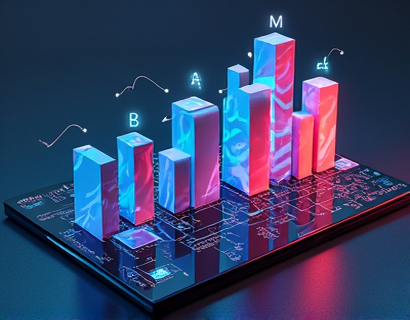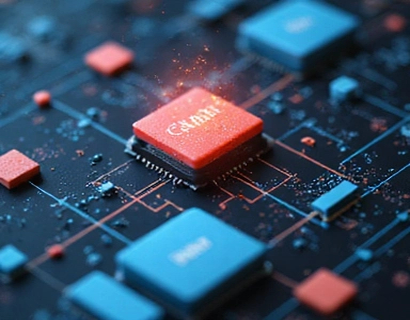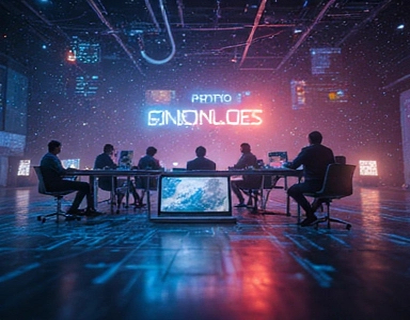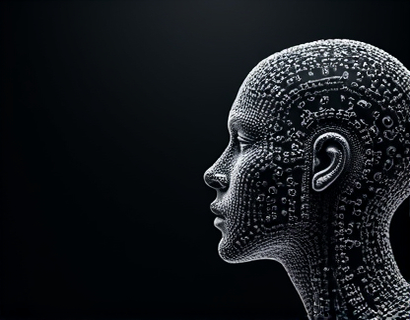Smart Contracts and Management Tools: Revolutionizing Governance for Enhanced Democracy and Participation
In recent years, the intersection of technology and governance has given rise to innovative solutions aimed at transforming traditional democratic processes. Among these, smart contracts and advanced management tools stand out as pivotal elements in creating a more transparent, efficient, and participatory governance system. This article delves into the transformative potential of these technologies, exploring how they can streamline decision-making, enhance transparency, and boost community engagement, ultimately fostering a more universal and participatory democracy.
The Role of Smart Contracts in Governance
Smart contracts are self-executing contracts with the terms of the agreement directly written into code. They run on blockchain technology, a decentralized and immutable ledger that ensures transparency and security. In the context of governance, smart contracts can automate and enforce the execution of agreements and policies, reducing the need for intermediaries and minimizing the potential for human error or manipulation.
One of the most significant advantages of smart contracts in governance is their ability to enforce rules and regulations automatically. For instance, in the realm of public procurement, smart contracts can ensure that all bids are evaluated based on predefined criteria, and the winner is selected and paid automatically once the conditions are met. This not only speeds up the process but also increases accountability and reduces the scope for corruption.
Enhancing Transparency through Blockchain
Transparency is a cornerstone of democratic governance, and blockchain technology, the backbone of smart contracts, plays a crucial role in achieving this. The immutable nature of blockchain ensures that once a transaction or contract is recorded, it cannot be altered or deleted. This transparency extends to all aspects of governance, from financial transactions to policy implementations.
For example, government spending can be tracked in real-time on a blockchain, allowing citizens to see exactly how public funds are being used. This level of transparency builds trust between the government and the governed, as citizens can verify that funds are being used as intended. Similarly, voting processes can be made more transparent by recording votes on a blockchain, ensuring that each vote is counted accurately and cannot be tampered with.
Streamlining Decision-Making Processes
Smart contracts and blockchain technology can significantly streamline decision-making processes in governance. By automating routine tasks and ensuring that decisions are made based on predefined rules, these tools can reduce bureaucracy and increase efficiency.
Consider a local government that needs to approve a new zoning law. Traditionally, this process involves multiple stages of review, public comment periods, and votes by city council members. With smart contracts, each step can be codified and executed automatically. Once the public comment period ends and the required number of approvals is reached, the new law can be automatically enacted. This not only speeds up the process but also ensures that all steps are followed consistently and transparently.
Boosting Community Engagement
One of the most promising aspects of smart contracts and management tools in governance is their potential to boost community engagement. By making governance processes more transparent and accessible, these technologies can encourage more citizens to participate in decision-making.
For instance, a city could use a blockchain-based platform to facilitate community voting on local issues. Residents could propose and vote on initiatives such as park improvements or community center upgrades directly through the platform. The use of smart contracts ensures that the voting process is secure, transparent, and tamper-proof, increasing the likelihood that citizens will trust and engage with the process.
Moreover, these platforms can provide real-time feedback and analytics, giving policymakers insights into public sentiment and preferences. This data can inform future decisions and policies, creating a more responsive and citizen-centric governance model.
Challenges and Considerations
While the potential benefits of smart contracts and management tools in governance are substantial, there are also challenges and considerations that must be addressed. One of the primary concerns is the technical complexity and the need for a skilled workforce to develop and maintain these systems.
Additionally, ensuring digital inclusivity is crucial. Not all citizens may have equal access to the internet or the technical knowledge to use these platforms effectively. Governments and organizations must work to bridge the digital divide, providing education and access to ensure that all community members can participate.
Privacy and security are also paramount. While blockchain offers a high level of security, it is not infallible. Robust security measures must be implemented to protect sensitive data and prevent unauthorized access.
Case Studies and Real-World Applications
Several initiatives around the world are already leveraging smart contracts and management tools to enhance governance. One notable example is the city of Zug in Switzerland, often referred to as the "Crypto Valley," which has implemented a blockchain-based identity management system. This system allows residents and businesses to create digital identities that can be used to access various city services, streamlining processes and enhancing security.
Another example is the use of smart contracts in the Netherlands for managing public housing. The government has developed a blockchain-based platform to track and manage the allocation and maintenance of public housing units. This has reduced administrative costs and increased transparency in the process.
Future Prospects
The future of governance through smart contracts and management tools is promising. As technology continues to evolve, we can expect more sophisticated and user-friendly platforms that further enhance democratic participation and governance efficiency.
One area of development is the integration of artificial intelligence (AI) with smart contracts. AI can help in analyzing large datasets to inform policy decisions, predict outcomes, and even automate more complex decision-making processes. This synergy can lead to more data-driven and effective governance.
Additionally, the rise of decentralized autonomous organizations (DAOs) presents an exciting frontier. DAOs are community-driven organizations governed by smart contracts on a blockchain. They have the potential to redefine how collective decision-making is handled, from non-profit organizations to large-scale public projects.
Conclusion
Smart contracts and management tools are revolutionizing governance by making processes more transparent, efficient, and participatory. These technologies have the potential to bridge the gap between governments and citizens, fostering a more inclusive and responsive democracy. While challenges remain, the ongoing development and adoption of these tools offer a promising path forward for enhancing democratic governance and participation.











































